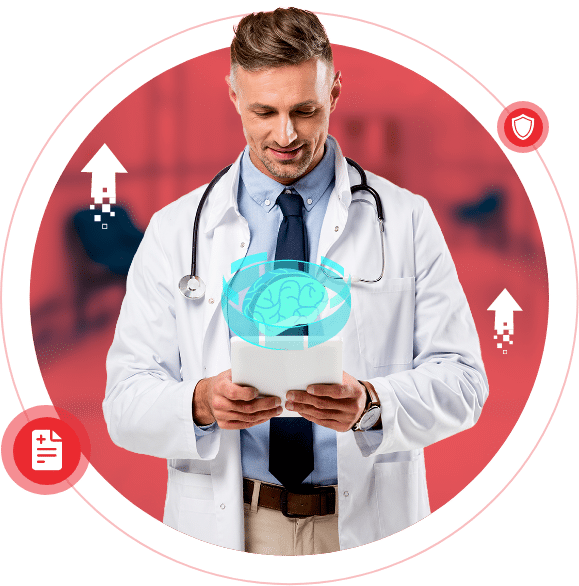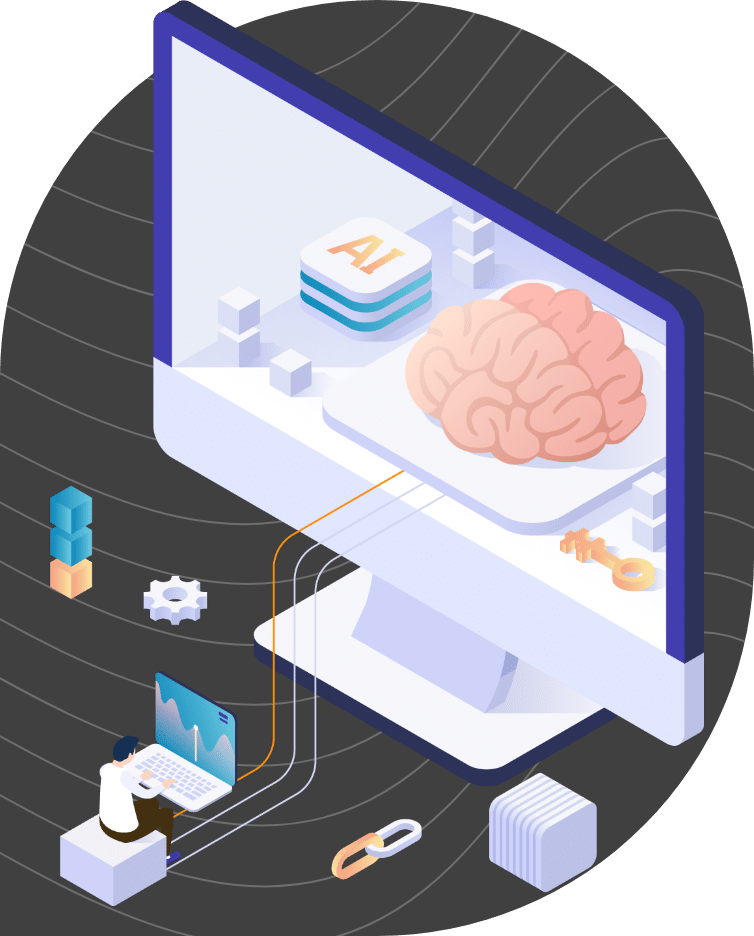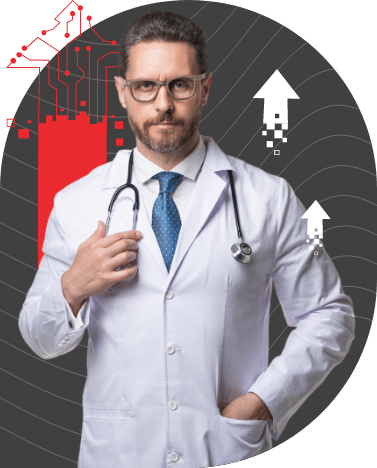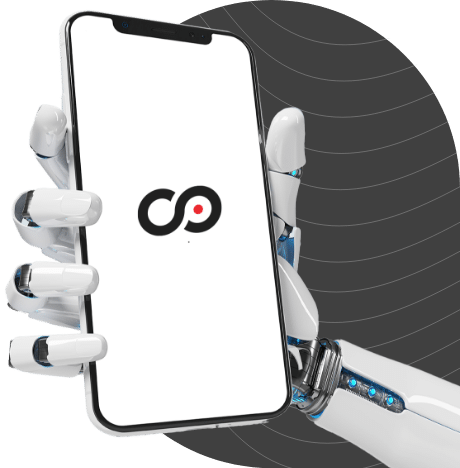Speeds up access to critical care information so providers and other care participants can use it immediately.


Artificial Intelligence Solutions
Cutting-edge technologies like natural language processing (NLP) and artificial intelligence (AI) are proving to be pivotal for healthcare organizations looking to streamline and automate cumbersome clinical workflows.
Schedule a personalized session to explore the ways in which out cutting-edge natural language processing (NLP) and artificial intelligence (AI) technologies can benefit you.
Required *
Clinical documentation is one of the areas ideal for automation as it plays a vital role in delivering quality patient care. However, it still relies on faxes and other unstructured documents to support medical information exchange.
Clinicians and administrators looking for faster and easier ways to interpret unstructured documents and extract the vital information they need are turning to automation tools. With the right tool, patient info can be automatically ingested into the patient’s EHR to enable clinical treatment within hours. Administrators can manage referrals and insurance Prior Authorizations in real-time and get access to public health and quality reporting more efficiently.
Automation and NLP streamline clinical and administrative workflows so the right data is connected with clinicians sooner and care is administered and managed sooner.

Overview
There are many opportunities for healthcare organizations to deploy automation and other AI tools to deliver more impactful, efficient and precise interventions to their patients. AI tools and solutions can deliver proactive, intelligent, hidden insights that inform diagnostic and treatment decision-making.
We developed Clarity to help healthcare organizations turn important but tedious fax workflows from manual, inefficient tasks into automated processes that happen reliably in the background. Clinicians and administrators can focus on more important work, like caring for patients. Consensus Clarity ingests information via fax and automatically adds it to the patient’s EHR. Critical information is flagged so relevant notifications are sent to staff for immediate attention, such as emergency test results or insurance messages.
Consensus Clarity AI transforms digital unstructured documents into useful and actionable data, improving and accelerating communications. It supports context-based understanding and reads entire documents before applying medically trained machine-learned intelligence. That way, Clarity removes roadblocks and optimizes resources across the continuum of care.
Benefits of AI in Healthcare
AI and automation offer numerous benefits if leveraged properly by healthcare organizations. It can sift through enormous volumes of health data faster than people can, offering insights that would’ve previously been missed or have taken months or years to discover. Clinicians can make faster and more informed decisions to enable more positive patient outcomes. Administrators can optimize workflows and enhance data security so that all facets of patient care work smoothly and efficiently.
Here are some of the most valuable benefits of AI and automation in healthcare.
One of AI’s most attractive features is how it automates redundant tasks for staff. Healthcare staff spend a lot of time doing paperwork and other admin tasks, so AI can do those for them, freeing up their time for higher-value tasks.
Clarity AI optimizes patient fax ingestion and EHR updates so they can rest assured the records are as updated as possible while leaving them free to interact with patients. It can also free up administration staff as Clarity handles insurance claim coding and information sharing between departments.
Other solutions can assist with note-taking and content summaries. In contrast, others handle medical scheduling to ensure that medical staff and equipment are used efficiently, minimizing patient wait times and reducing resource wastage.
Diagnosing and addressing medical issues requires accurate and timely information. With AI in healthcare, clinicians are able to leverage immediate and precise information to expedite decision-making, generate more rapid results and develop a more holistic view of their patients.
Wait times go down because clinicians and administrators are accessing real-time or near-real-time information. For example, wearable technology like smartwatches and fitness trackers generate a wealth of data that healthcare AI can analyze to alert users and healthcare professionals on potential health issues and risks.
Linking as much healthcare data as possible in healthcare settings makes it easier for AI solutions to compile and analyze large amounts of clinical data. They can do it faster and more effectively than humans can. Current challenges to this include data governance and security issues, but once they are satisfactorily addressed, it opens the door to more AI in healthcare.
Applying AI solutions to some healthcare processes helps to reduce the time and resources needed to examine and diagnose patients. Clinicians and other healthcare providers save more lives by acting faster with accurate and timely data. AI identifies risks faster and more accurately than traditional workflows and automates inefficient and manual processes to speed up diagnoses and reduce diagnostic errors (the single largest cause of medical malpractice claims.)
For example, one study found that various AI algorithms could more accurately predict when an appendectomy was needed in over 80% of appendicitis cases. This could help specialists make more informed decisions regarding appendicitis cases and treatments. In another study, another AI tool was better at detecting early breast cancer (91%) than radiologists (74%.)
AI can more efficiently analyze medical images like X-rays and MRIs with granular precision. This translates into more reliable, accurate and faster diagnoses so providers can offer timely treatments and interventions. AI in healthcare is being used to detect subtle patterns and anomalies in patient data and contribute to early disease detection. For example, it can identify chronic disease markers for diabetes or certain early-stage cancers, enabling healthcare professionals to intervene sooner and potentially prevent further disease progression.
Since prevention is often more effective than treatment, AI in healthcare is a powerful tool. It can predict disease outbreaks and identify potential health risks in individuals and populations. More use of AI in broader specialities like cardiology, neurology and oncology can fuel the advances being made in these disciplines that are already happening.
AI can be instrumental in forecasting the course of chronic illnesses in patients. It empowers healthcare providers to implement preventative measures by identifying risk factors and finding early warning signs. This helps patients manage their health better and ultimately reduces the burden on healthcare systems overall.
Involving patients in their healthcare is a critical aspect of creating healthier outcomes as it influences treatment adherence more positively. AI-driven platforms and healthcare apps provide patients access to their medical records, test results and personalized health recommendations. AI can offer personalized health tips and encourage healthy behaviors by analyzing available patient data.
For healthcare providers, AI-powered scheduling tools can predict how likely a patient is to cancel, show up late or arrive on time for their appointment. This helps optimize your clinical schedule and can automate billing for no-shows. Newer tools enable physicians to capture vital information from patients in a telemedicine appointment or even before an in-person visit. Healthcare administrators can collect copays and patient payments more easily with an AI-powered portal. It can track who’s paid and when, and send secure payment links so patients can pay online.
More AI solutions will help the shift from hospital-based care to home-based care through remote monitoring, AI-powered alerting, medical virtual assistants and telehealth. When patients actively participate in their care, they’re more likely to achieve positive health outcomes.
Because AI can aggregate and analyze large volumes of data from various sources, it can be a boon to medical researchers. The ability to access relevant recent information and analyze it sooner allows for more effective use of the data, cutting down on the timeline for healthcare.
It could guide future discoveries by uniting and analyzing data across publications and disciplines such as chemistry, biology and medicine. AI could connect chemical properties to biologic behavior and then to clinical phenotypes and patient symptoms faster than a collaborative working group could.
Another example is to have an AI tool review already-approved therapies to determine if they can be used on alternative indications. For example, it could estimate the biological proximity of the therapy’s use for one indication to another from a patient and clinical perspective. It would analyze the data about the therapy, the patient’s history and previous clinical applications to determine the probability of success or negative outcomes.
Medical students and professionals will be able to use AI-powered tools and simulations to deepen their understanding of medical procedures and concepts. Immersive experiences driven by virtual reality (VR) and augmented reality (AR) allow students to practice surgeries or diagnose patients in a safe and risk-free environment. It can also facilitate continuous learning sessions with existing medical professionals keen to learn new procedures, treatments, or methods.
AI-driven chatbots and virtual assistants are rapidly becoming valuable resources to all medical staff by answering medical questions and saving them time from having to research the questions themselves. This feature is especially useful to clinicians in remote locations or ones without easy access to medical literature such as that at a medical library. By enhancing medical education, AI contributes to improving healthcare quality and patient safety.
Clarity AI Solutions
Consensus Clarity AI simplifies and automates the clinical documentation fax process with a turnkey solution. Clarity transforms unstructured documents like digital scans and faxes into structured, actionable data. It uses Natural Language Processing (NLP) and Machine Learning to uncover insightful information that’s sent to the right clinician at the right time, accelerating patient treatment across the continuum of care.
Benefits of Clarity AI
CASE STUDIES
Many customers use Consensus Clarity AI to connect with clinicians sooner and administer care earlier. It offers a fully customizable approach to support your tech and clinical workflow needs, from fax to FHIR, FHIR to fax and everything in between.
Here’s how a few of Consensus Clarity customers are using it.

The Healthcare Promise
Healthcare should be effective, compassionate and patient-centered to help people achieve better health. That’s the promise that every healthcare organization, clinician and care provider should follow.
To support that promise, healthcare systems should be centered around the needs of individuals and offer healthcare to all. It should provide people with the information, encouragement, incentives and support needed to remain healthy, obtain early and accurate diagnoses when ill and receive the best quality care and treatments.
As the attendees to the most recent U.N. General Assembly stated, “To keep the promise of Sustainable Development Goals—including health for all—requires building health systems that leave no one behind and reach the furthest behind first.”
Next Steps
Request a Consensus Clarity demo to learn more about how we can:

AI in Healthcare Is Here
The advent of AI in healthcare has ushered in so many possibilities. From enhancing diagnosis and early illness detection to revolutionizing novel drug discovery and applying existing treatments in new modalities, AI’s benefits are a transforming engine. It streamlines admin tasks such as patient record keeping, facilitates disease prevention with personalized health suggestions and empowers both patients and medical professionals with accurate data faster.
Going forward, the potential for AI to improve healthcare outcomes continues to evolve. Embracing the technologies is no longer a choice, it’s a responsibility healthcare owes to the health of people and communities globally.
Enhance the quality and efficiency of your healthcare system by analyzing and extracting insights from the volumes of data your healthcare organization already has through AI.
